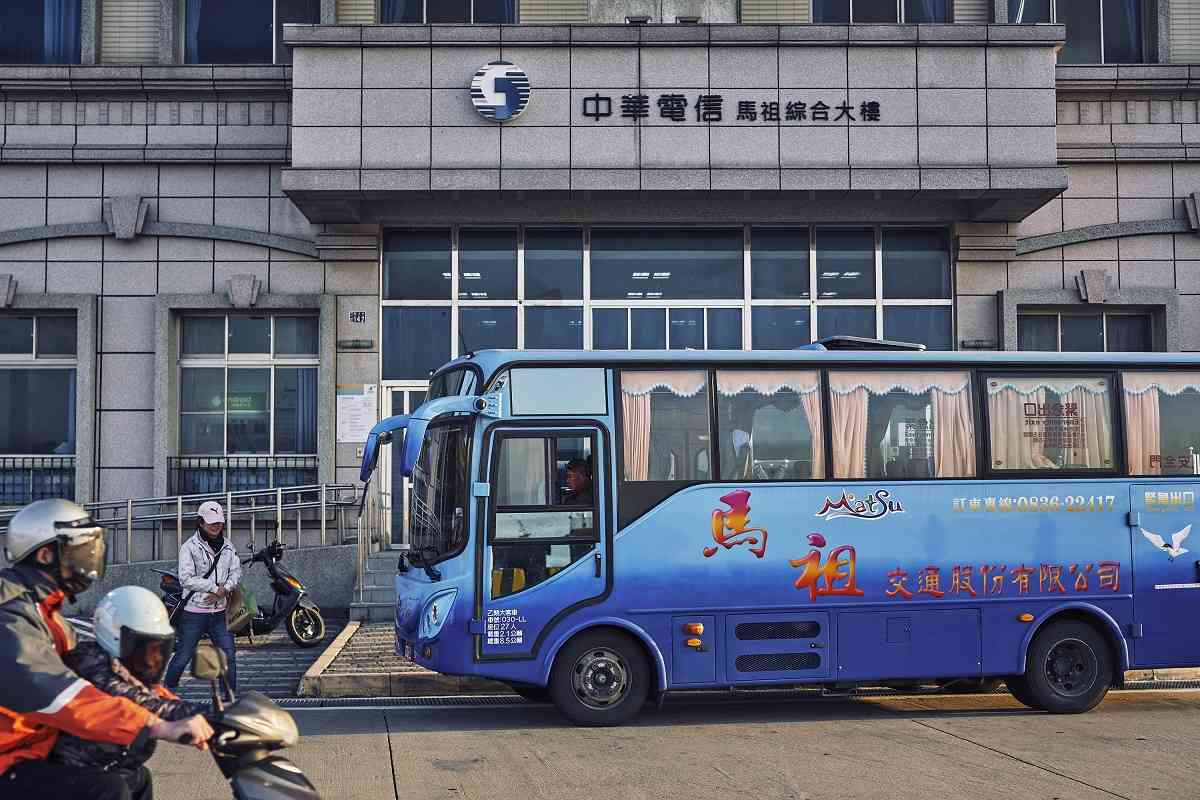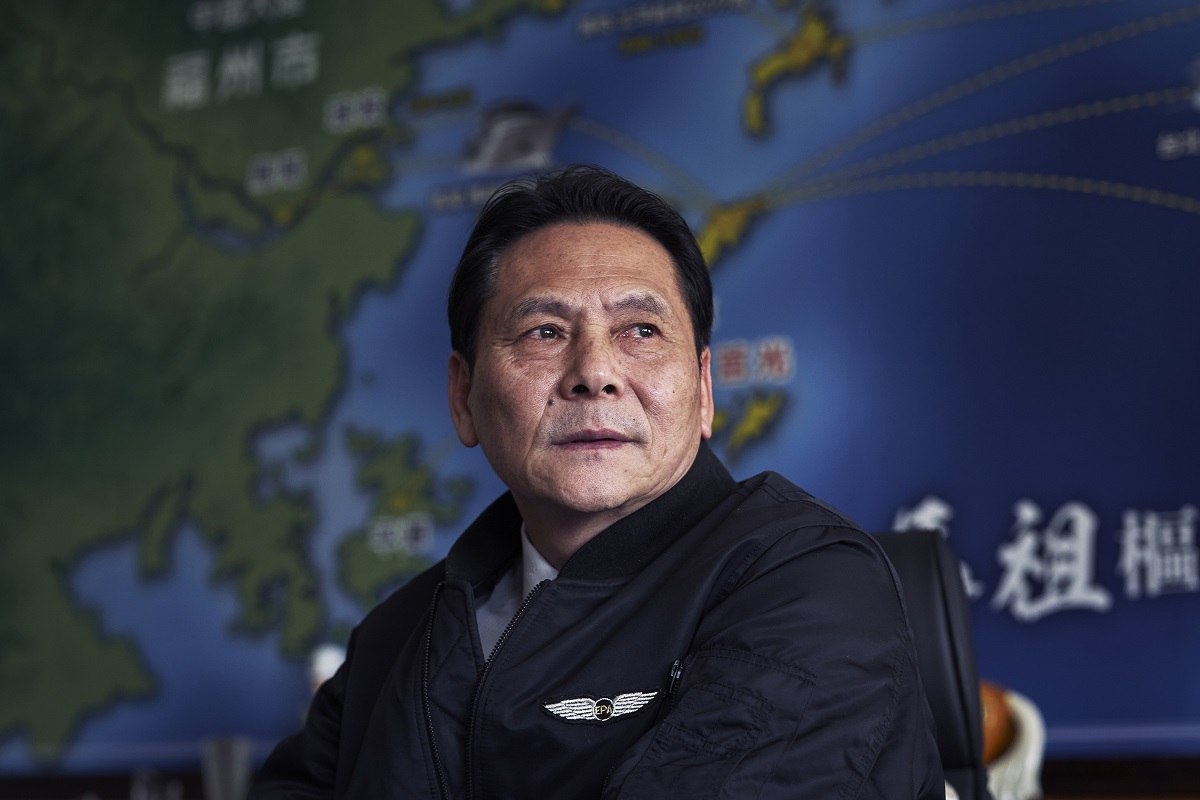
Chen Pao-chung, a tour bus driver on Nangan Island in Matsu, sits outside the Chunghwa Telecom store to use its WiFi.
14:23 JST, March 10, 2023
MATSU, Taiwan – For the past month, an entire island has depended on Li Tsui-yun’s mobile phone store for internet access.
Since the undersea internet cables that serve the Matsu island chain – part of Taiwan but at points only a few miles from China – were severed just over a month ago, Li has felt like everyone on the island of Nangan has turned up at her outpost of Chunghwa Telecom to get online: soldiers calling family, kids doing their homework, hotel owners checking online bookings.
On the coldest days, Li handed out hot tea at the door and kept the store open late so people could sit inside. “The other night there were cars stopped all around,” said Chen Pao-chung, who had parked his empty bus outside Li’s store to check his messages.
The cause of Matsu’s internet outage is familiar: Chinese fishing boats, so omnipresent that the nightly glow of their green lights has become known as the islands’ own aurora borealis.
Wayward anchors and trawling nets have taken out the islands’ two internet cables 27 times in the past five years. But this is the first time Matsu has faced such a long outage, as one of the world’s few dozen repair ships won’t be available to fix the breaks until the end of April.
The first cable was damaged Feb. 2 by a Chinese fishing boat and the second Feb. 8 by a Chinese cargo ship, according to Taiwanese authorities. This plunged residents back in time and forced them to confront what life would be like if increasing tensions with China made Taiwan’s internet infrastructure an intentional target.
Tensions have flared in recent months following U.S. House Speaker Nancy Pelosi’s visit to Taipei in August.
Taiwan’s military maintains a major presence in Matsu. On a recent night people in fatigues jogged around Nangan harbor, across the street from Li’s store, and played basketball outside the Matsu islands’ only Starbucks.
There is no evidence that the cables were severed intentionally, according to Chunghwa Telecom. But analysts and local officials have said the frequent cable breaks caused by Chinese vessels amount to purposeful harassment that keeps Taiwan’s government and telecom companies scrambling to provide basic services.
“What happened in Matsu can be seen as a warning signal,” said Wen Lii, the head of the local chapter of Taiwan’s ruling Democratic Progressive Party (DPP). “If an internet outage could happen for Matsu, the same thing could happen for Taiwan – what would we do if Taiwan’s 14 international undersea cables were damaged?”
The Matsu island chain was on the front line of fighting during the Chinese civil war in the 1940s and its closest island is just six miles off the coast of China’s Fujian province. The islands, home to about 14,000 people, depend heavily on tourists drawn to the quiet, once heavily fortified beaches where bunkers have become hip cafes and guesthouses.

Matsu mayor Wang Chung-ming has proposed laying an undersea internet cable between Matsu and Fujian.
But without the internet, business has slowed to a trickle. Half a dozen hotel and restaurant owners said that the ongoing outage meant their business was down at least 50 percent compared with the same time last year.
“At its worst point, the phone barely rang at all, and the calls that did get through were full of noise,” said Wang Yuan-song, who owns a hotel near the airport on Beigan, one of the Matsu islands. “There was no way to communicate normally.”
After a shorter outage put his business on hold last April, Wang was prepared for this one. He had friends on Taiwan’s main island send him prepaid mobile SIM cards, then put the cards into his own internet routers to make shareable WiFi hotspots for guests. The weak signal was barely usable, but better than nothing, he said.
Chunghwa Telecom has set up a high-powered microwave radio transmission from towers near Taipei to provide a backup signal for online banking and other basic services for Matsu residents, but service is intermittent and slows to a crawl during peak use.
Chinese military ships, fishing vessels and sand dredgers regularly cross into Taiwan’s waters using what military analysts describe as grey-zone tactics – part intimidation campaign, part resource extraction – intended to keep Taiwan’s people and government on alert.
The Chinese Communist Party government shelled Matsu for decades after the nationalist Kuomintang (KMT) government retreated to Taiwan in defeat in 1949, and gained control of some of the outlying islands that are much closer to China than Taiwan.
In doing so, they drew an invisible boundary across previously free-flowing fishing grounds. Matsu’s rocky coastline, lined with the same type of stone houses built in Fujian, was fortified with land mines.
But China’s proximity is not just a threat for Matsu residents – for many, their neighbor is also a source of practical solutions. During the most acute parts of the outage, some Matsu residents stayed online using SIM cards from China.
Some locals found ways to get SIM cards from China and connect to cell signals from inside the Great Firewall – a lifeline despite Beijing’s restrictions.
In January, when Beijing loosened its strict “zero covid” policy that had sealed China off from the rest of the world, ferries between Matsu and Fujian – which have long allowed people from both sides to visit relatives and check on properties and investments – resumed service.
A couple of weeks ago, Matsu’s mayor, Wang Chung Ming, took a ferry to Fuzhou with a proposal: laying an undersea internet cable between Matsu and Fujian.
The mayor – a fixture of Matsu’s Kuomintang establishment, which has historically maintained closer ties to China than the DPP – told officials in Fuzhou and the vice chairman of China Mobile Communications Group that he hoped Matsu could be like Kinmen, another Taiwanese island chain a few miles off the coast of China which shares an internet cable connected to southern Fujian.
Though he has laid the groundwork for a deal, the cable outage is a “national security” problem that can’t be solved at the local level, he said.
Wang now needs Taipei’s approval. “Fuzhou has basically said yes. The rest is up to our side,” he said.
The problem posed by the frequent cable breakages – and their costly repairs – is one thing officials from Taiwan’s two rival political parties can agree on. Kuomintang and DPP leaders have expressed concerns about Taiwan’s preparedness for future breaks.
“Taiwan needs to be better prepared in case of any type of emergency, regardless of whether it’s a natural disaster or a military threat,” said Lii, the head of the local DPP chapter, who called on the international community to help strength Taiwan’s communication capabilities.
Military analysts and officials said the frequent breaks highlight the vulnerability of Taiwan’s internet infrastructure.
“Cable sabotage could become our era’s blockade – and unlike past generations’ blockades, it can be conducted on the sly,” warned Elizabeth Braw, a fellow at the American Enterprise Institute, in an analysis for Foreign Policy.
Taipei is reportedly in talks with domestic and international investors to establish its own low-Earth-orbit satellite internet service, similar to Elon Musk’s Starlink, which has provided internet to Ukraine with some assistance from the United States government.
“When wars occur, this technology has its purpose,” said Matsu mayor Wang.
Taiwan’s Ministry of Digital Affairs declined to comment on the status of proposals for its own satellite internet network.
In the meantime, a bulked-up version of the microwave radio signal could suffice, Wang said. Taiwan’s National Communications Commission said the system is still under construction, and that it would more than double its bandwidth by the end of the year.
Anita Tsai, who runs a restaurant in Dongyin, Matsu’s northernmost island, shared the same frustrations over the frequent internet disruptions. “At its worst, it took me five minutes to watch a ten-second video,” said Tsai.
Tsai isn’t worried about whether the internet comes from a cable, a satellite, a radio wave, or from China – she just wants her children to be able to attend their online classes.
“Matsu people have always been practical,” said the Beigan hotel owner, Wang Yuan-song. “They can’t take on matters of ideology, because ideology is not something you can eat.”

Wang Yuan-song, the owner of the Long Fu Hotel on Beigan island in Matsu, says there was “no way to communicate normally” at the worst point of the internet outage.
Top Articles in News Services
-

Survey Shows False Election Info Perceived as True
-

Hong Kong Ex-Publisher Jimmy Lai’s Sentence Raises International Outcry as China Defends It
-

Japan’s Nikkei Stock Average Touches 58,000 as Yen, Jgbs Rally on Election Fallout (UPDATE 1)
-

Japan’s Nikkei Stock Average Falls as US-Iran Tensions Unsettle Investors (UPDATE 1)
-

Trump Names Former Federal Reserve Governor Warsh as the Next Fed Chair, Replacing Powell
JN ACCESS RANKING
-

Producer Behind Pop Group XG Arrested for Cocaine Possession
-

Japan PM Takaichi’s Cabinet Resigns en Masse
-

Japan Institute to Use Domestic Commercial Optical Lattice Clock to Set Japan Standard Time
-

Man Infected with Measles Reportedly Dined at Restaurant in Tokyo Station
-

Israeli Ambassador to Japan Speaks about Japan’s Role in the Reconstruction of Gaza
























